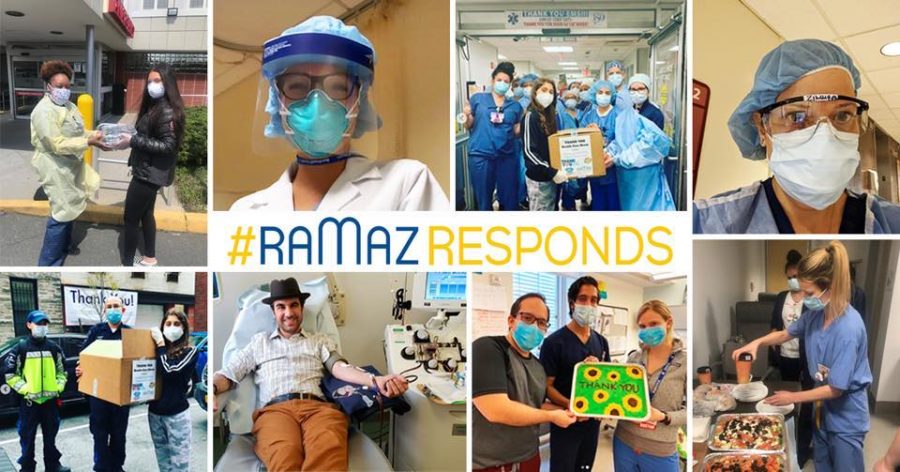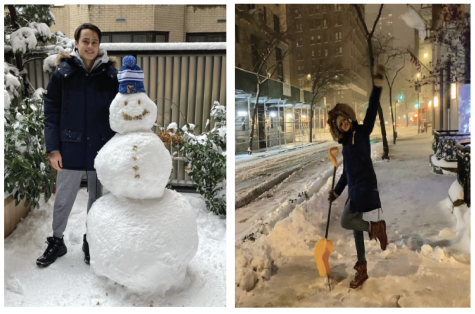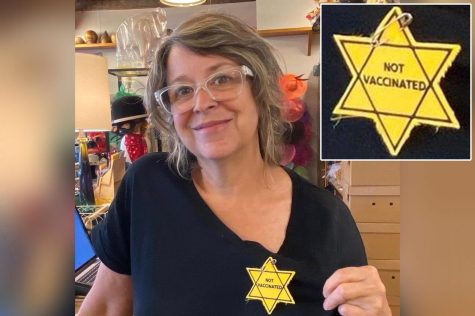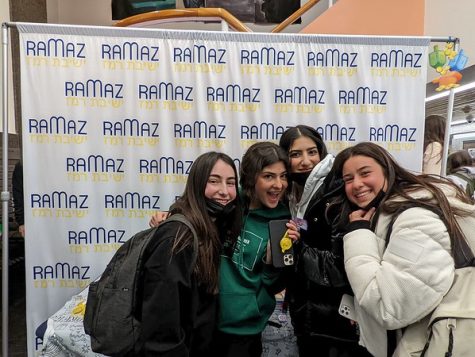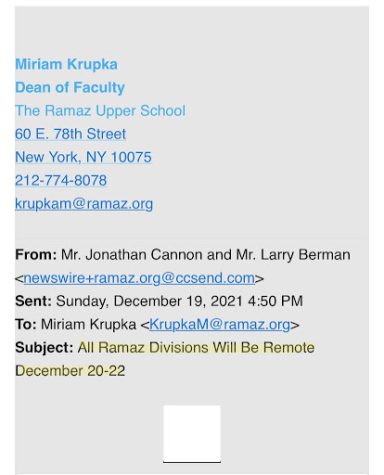Weavers: Knitting Communities Together
Chesed is a word used to describe the love and compassion among humans present in daily life. Helping others is the essential backbone of Jewish life. Even before Ramaz students started going to school, they learned the value of helping their parents and sharing toys with their friends. They were raised to constantly think about ways to improve humanity through organized and individual donations of money and time to those in need. In this time, where human contact is at a minimum, the challenge to pursue chesed has become much more difficult, yet also much more urgent. While many are staying safe at home, stocked up with toilet paper and hand sanitizers, many others are hunkered down alone and lack necessary resources. Such circumstances lead to fear of the unknown and chronic loneliness.
As New York Times columnist David Brooks said, “Even in a pandemic there are weavers and reapers. The Weavers [are those who] try to spiritually hold each other so we can get through this together” (NYT May 2). Mr. Brooks has previously written of his Jewish background and experiences. His understanding of chesed challenges everyone to be “weavers” in their own communities. Now that many students have extra time on their hands due to the elimination of commutes, fewer extracurricular activities, and less time outside the house, giving to others should fill the void and provide the opportunity to be a “weaver.”
Many Ramaz students fall into Brooks’ categorization of being “weavers” during this period of isolation. Students have done an impressive job finding creative ways to engage in acts of kindness and to strengthen communities. Such acts include Zoom meetings to connect, learn, and share with others, donating materials, and showing gratitude towards essential workers and first responders. Students have taken the responsibility during this crucial time to bring joy to those in need.
While many students have been doing chesed anonymously, many students have shared their efforts with the community. Here are some inspiring examples of what Ramaz students have been doing, as described by Ms. Benel.
- Welcoming Our Troops Home: After returning from a tour of duty in Afghanistan, 300 servicemen and women were forced to quarantine themselves for fourteen days in North Carolina. They were prohibited from reuniting with their loved ones. Ramaz students connected with these isolated service people by sending cards to express their appreciation to them and their families.
- Chaveirim: Upper School students have been reaching out to Lower School students to create connections and foster community. They have been reading stories, playing games, and having fun conversations with the children.
- Canning For Good: Another amazing student chesed initiative was done by Ramaz’s weekly sandwich packers and Tray’s Trio leaders (Mati Finklestein ’22, Alex Berman ’22, and Michael Lindenbaum ’22). Since neither of these two groups could deliver their lunch bags or leftover trays of food every week, the groups created a PayPal account. They raised $500 for each shipment of canned goods to replace weekly donations.
- Masks and More: As the Ramaz community began to understand the needs of frontline workers, Ms. Johanna Shlomovich collected usable gloves, goggles, and masks from the nurses’ offices, the science labs and cleaning supply closets. Ms. Shlomovich delivered them to hospitals in need.
- Goody Bags: Many students have been finding ways to show gratitude towards medical professionals and essential workers. Students have packed goody bags filled with candy and delivered them to hospitals. Additionally, some students have also organized food donations to their local hospitals.
- SBH: A Call for Callers: Sephardic Bikur Cholim requested help for 20 homebound elderly adults isolated from their families. They requested that some students call and talk to the seniors. Many Ramaz students answered the call and offered their time to make someone else’s day a little bit better.
- Pesach and Numbers: Who Knows One? Ms. Rena Lunzer, Ramaz Finance and Human Resources Assistant, called Ms. Benel and explained her connection to #KosherResponse. #KosherResponse received a huge donation of Kosher L’Pesach food packages from Gourmet Glatt, KolSave Market, Landau’s Apple Crisps, and Elegant Desserts, and necessary entrées for NYC hospitals. The packages will be distributed to health care workers who are working tirelessly to save lives. Rabbi Simcha Silverman, Chaplain at Lenox Hill Hospital recognized Ramaz students’ dedication to chesed in the past; Ramaz students have made a weekly mincha minyan for medical personnel, read megillah on Purim for health professionals, and visited families and patients in the hospital. Rabbi Silverman immediately connected Ms. Lunzer to administrative personnel at several NYC hospitals who would dole out the food to patients in need. Over 650 meals have been distributed.
- Home Alone: Zooming with Our Friends: Throughout the year, many Ramaz students work with developmentally challenged young men and women, and knowing that they too are staying home these days, students thought of the idea to have a lunchtime Zoom together. Two Ramaz students were paired with each of these men or women. Maintaining consistent connections is extremely important to everyone right now, especially to those who rely more heavily on constant human interaction.
- Cooking with Caleb (Rosenfeld ’22): Since he was 12 years old, Caleb has been filming and hosting a cooking show at Mt. Sinai Hospital. Mt. Sinai has its own closed-circuit TV channel and production studio. These days, instead of taping at the hospital, Caleb now films the show from his home kitchen. Caleb’s fun and delicious recipes are enjoyed weekly by the patients, and he can stay safely at a distance.
- Sketching Together: Daniella Woldenberg ’23 has been drawing and sketching for many years now. Recently, Daniella began working with a few homebound elderly individuals via Zoom. As she shares her skills with them, she encourages them to be creative. Daniella’s students can sketch the lines and images that speak best for their interests and feelings. The time they spend working on projects can alleviate loneliness. Daniella and her students also enjoy plenty of conversation and laughter.
- Mittler Senior Technology: Since the beginning of the coronavirus outbreak, Jordan Mittler has been continuing to teach his weekly technology classes to seniors via Zoom. He spends each week covering topics that are most relevant during this time such as online grocery shopping and accessing the news. Mittler Senior Technology is keeping seniors involved and active during this time of isolation.

